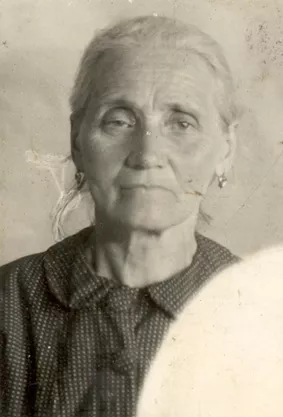Mushe Ita Gershenovichene
This is my mother Mushe Ita Gershenovichene. This passport photograph was taken in Kaunas in the 1930s.
My mother was born in 1886. Before getting married, she lived with her parents, helped them about the house and took care of the cows. When Grandmother died, and Mother’s brothers – Motl and Dovid – left home, my mother stayed with her father and his second wife. They didn’t stay on the farmstead long. In 1909 my father proposed to my mother. Of course, old Jewish match-makers played their role. My parents wouldn’t have met each other without them. Their wedding took place in Zarasai. My parents were wed under a chuppah in a local synagogue. They moved to Kaunas after the wedding. Grandfather Berl Idl bought them a tiny house on Grushevaya Street in Zelyonaya Gora. He and his wife Hanna also moved there as it was hard for my parents to take care of the farm without them. Since that time Berl Idl and Hanna lived with my parents. Grandfather died in 1919 and Hanna was buried in 1928.
In 1910 Mother gave birth to my elder sister Hanna and in 1913 Rochl was born. On 14th December 1914 I came into the world. I was called Toybe-Rivke. My parents dreamt of a son and fate sent them two. In 1917 Efraim was born in and in 1920 the youngest son was born and named after Grandfather Berl Idl, who had just passed away.
We were very poor. Our food was also scarce. During the week Mother cooked thick potato soup with onion for everybody to fill up their stomachs. It was easy to stop the hunger with that, but low-calorie food didn’t quench hunger for a long time: we were hungry before soon. There was meat on the table as well. One of my mother’s friends kept a butchery store. She was sorry for us and sold my mother small pieces of meat dirt cheap and Mother managed to concoct something out of it for all of us. She knew how to cook things almost out of nothing. She cooked tasty latkes, kneydlakh. We had chicken broth only on holidays. Grandmother Hanna daily went to the charity Jewish canteen, where the poor were given some food. She brought thin soup or porridge from there. It was also helping our family. Nonetheless, we didn’t starve. Mother knew how to calculate the ration in such a way that we always had something to eat, be it even the simplest food.
























